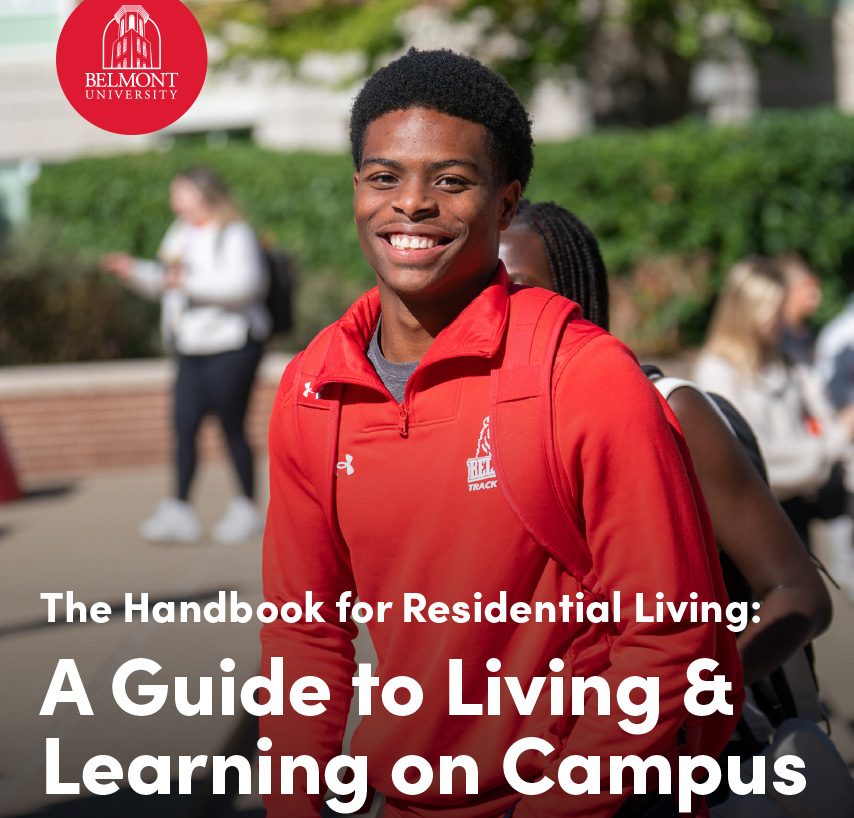There are a few documents you should be familiar with if living on campus. They provide important information about Residence Life policies as well as Belmont's student policies.

Bruin Guide
The Bruin Guide is Belmont's student handbook. Included in the Bruin Guide are explanations of our Community Commitments as well as all of our student policies.

The Handbook for Residential Living
The Handbook for Residential Living provides information about Residence Life, our policies, and how to navigate living on campus. It also includes a helpful guide for students about living on campus, services offered by the university, and a complete description of Belmont University's expectations and policies.
Other Documents
The Housing Occupancy Agreement is your "contract" for living on campus. It includes important policies and dates that you should familiarize yourself with as a campus resident. The University Cost Estimator is a helpful tool for planning your college expenses, including housing and meals.
Housing Occupancy Agreement
The terms and conditions for living on campus
University Cost Estimator
Costs for Housing and Meal Plan Rates
Roommate Agreements
Part of our mission in Residence Life is to empower students to make successful transitions to college, and part of making that transition successful is learning to live with a roommate. Living and forming relationships with people from different backgrounds is one of the greatest benefits to living on campus. Whether your roommate is a friend from home or someone you are meeting for the first time, your relationship with your roommate can both work and be enjoyable.
At Belmont, all first-year students are required to complete our Roommate Agreement online through our Roompact software. RAs in the residence halls will meet with each roommate pair within the first month of class to discuss their roommate agreement.
Communication is essential to a positive, working relationship between roommates or suitemates. By discussing the topics outlined in the Roommate Agreement, roommates will begin to develop a relationship that is conducive to a positive community and academic environment as well as personal growth. This process will also reduce or eliminate the possibility of conflict and increase communication between roommates.
- In your browser, type in the web address www.Roompact.com.
- You will be prompted to type in your Belmont student email. Once you do, you'll be redirected to the my.Belmont.edu portal and will log in using your credentials.
- When logging in to Roompact for the first time, you will be prompted to complete the Agreement Helper, which will ask you a series of questions. We advise that you and your roommate complete the agreement together, using one computer. Discussing and completing the Roommate Agreement in person is an important part of the process.
- After completing each question, you can review and modify your Agreement by clicking on the pencil icon on the right side of the term box.
- You can add additional custom terms that are specific to you and/or your roommate by typing in the text box at the top of the Agreement by typing in the text box at the top of the Agreement and clicking the green plus sign (+) button.
- After reviewing each term, you will sign and save your Agreement.
- At the bottom of the Agreement, a dialogue box will indicate if your roommate(s) have not signed yet. Click on the green button that says, "Yes, let my roommate sign too!"
- Type in your roommate's Belmont email address and they will receive an email requesting them to sign the Roommate Agreement.
- At any point in the semester, you and your roommate(s) can review and revise your Roommate Agreement by clicking on Roommate Agreement on the left side of the Roompact homescreen.
As a Belmont University residence hall community member, the following are the rights you can expect and have a responsibility to maintain:
- The right to read and study free from undue interference in one's room (unreasonable noise and other distractions inhibit the exercise of this right).
- The right to sleep without undue disturbance from noise, guests of a roommate, etc.
- The right to expect that a roommate will respect one's personal belongings.
- The right to a clean environment in which to live.
- The right to free access to one's rooms and facilities without pressure from a roommate.
- The right to personal privacy.
- The right to host guests with the exception that guests are to respect the rights of the host's roommate(s), other complex residents and the visitation policy.
- The right to address grievances. Residence Life staff members are available for assistance in settling conflicts.
- The right to be free from fear of intimidation, physical and/or emotional harm, and racial, sexual or other prejudicial harassment.
Sharing a room and space isn't always easy and can often lead to misunderstanding. If you believe that your roommate has infringed upon your right, express your concern to him/her. Developing a good relationship early on may help you to approach your roommate(s) when you discover an issue on which you do not agree. Also, be aware that your roommate(s) may approach you for similar reasons. If you feel you need further advice, you should speak with your Resident Assistant or Residence Director.
Roommates do not have to be best friends, but they need to live amicably and respectfully. Roommates should share responsibility for the roommate relationship: To have a good roommate, be a good roommate! Learning to live with a roommate without infringing on one another’s rights and freedoms is a valuable part of your education.

